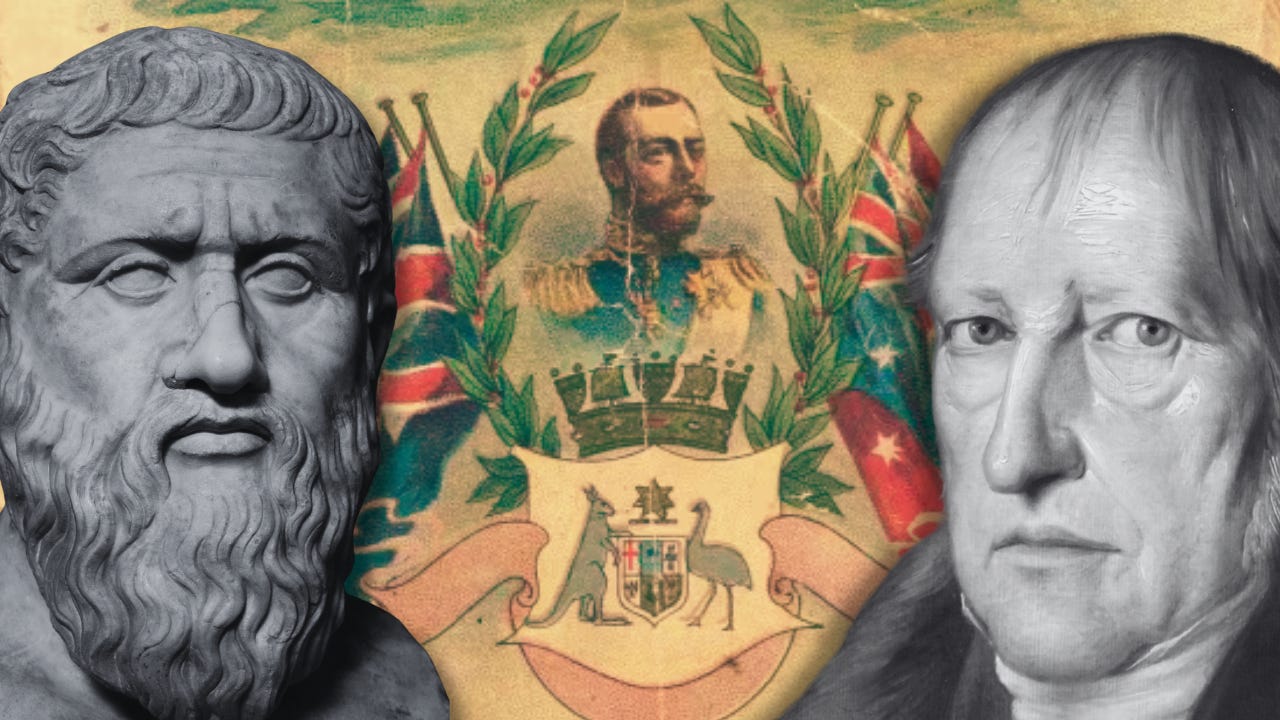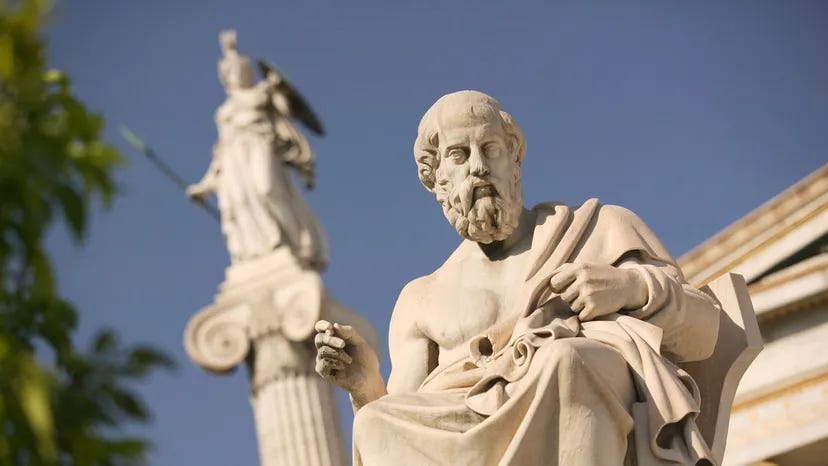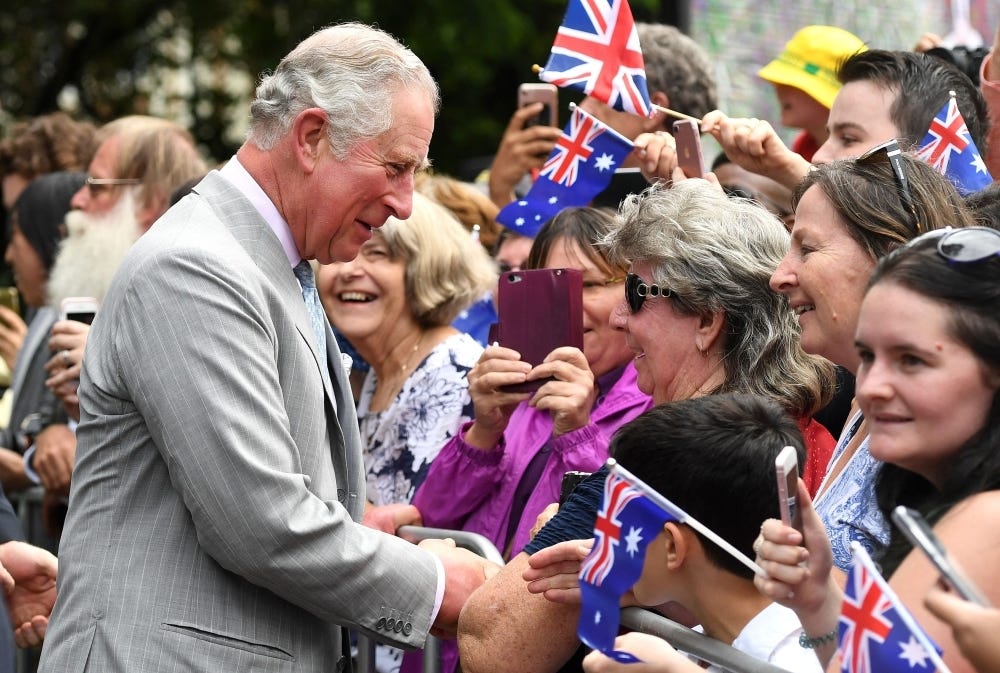Hegel, Nativism, and Ideology
On the Australian political dialectic, and what Hegel can teach us about it
Written by Elias Priestly, you can find all his previous articles on the Australian Natives Association website and find more of his content on 𝕏 @Aussie_EliasP
Hegel. The name might strike fear into the professional philosopher who knows the mountains of secondary literature on him, or raise an unsettling memory in an unsuspecting victim who thought they’d have a go at reading one of his books - after all, how hard could it be?
But although Hegel’s philosophy is complex, it is fair to say that at its core is the relatively straightforward desire to reconcile the organic national culture and language expressed in Romanticism with the universal ideals of reason that were championed in the Enlightenment. According to the Hegel scholar, Charles Taylor, the Romantic side of Hegel’s thinking is concerned with “unity with nature, other men, and himself” while the rationalist side seeks to preserve “radical moral autonomy”. These are the two sides of a dialectic of opposites that Hegel wanted to sublate - to overcome the contradiction between the two while preserving their best aspects in a higher unity.
Australian Nativists have much to learn from this Hegelian project. Like the Romantics, we are interested in the organic development of the Australian people and culture, and we identify with Australia on a deeply emotional level. We love our Banjo Paterson Day when we enjoy poetry that reflects our folk spirit. We love our Wattle Day when we deeply appreciate and feel a sense of unity with the Bush and the broader natural world that expresses the goodness of being, the beauty of God’s creation. This organic rootedness that we have in our Australian homeland was best expressed by Ian Mudie in his poem Earth:
Earth is our fire, our meat, our beauty,
from earth comes the matter of our minds;
all things we love are earth,
earth moulds us, from earth
we spring, and from the earth
we gather knowledge.
We eat, and we eat earth,
we drink, and the flavour of the wine
is made by earth.
Is it not good to love
the earth we know? The vine that grows
beneath the gum makes wine of flavour
foreign to northern vintage.
Earth then is in our blood;
And shall we twist our minds
as if they fed on alien soil?
Earth in our blood.
Our earth.
This earth.
But even though we understand and feel comfortable in this Australian particularity, like Hegel we must also learn to appreciate its dialectical opposite: universality and rational ideology. Let me expand on this briefly. The nature of rational thought and conceptualisation is universal. When we think of a concept, like “tree”, we think it generally and when we predicate in a sentence we bring the particular that we see under the umbrella of the universal that we think: “This thing is a tree.” As in Plato, both sides of the sentence, the thing and the concept, are based on the Idea. The world of matter is ideas embodied in patterns, and these are mirrored in the world of thought. The difference from Plato is that Hegel believes that these patterns develop dynamically through a dialectical process.
All of Hegel’s philosophy is basically a development of these actions of speech and dialectical development. For Hegel, the Subjective Spirit, or God in Himself, embodies Himself in nature as the Objective Spirit in order to express and discover His possibilities through a providential, rational, and dialectical movement through history that culminates in His understanding of Himself as the Absolute Spirit. This is a complicated combination of Platonist, Christian, and Gnostic ideas on God’s creation and providential guidance of the world that we do not need to delve into too deeply or follow too closely. To be absolutely clear, I do not think we should adopt Hegel’s metaphysical apparatus, particularly his process theology. However, what we should understand is that this picture of creation that Hegel paints forms the paradigm for his understanding of human society and politics, where the subjective consciousness of individual human beings is embodied in collective social and political institutions and is worked out through these institutions towards the goal of achieving the good and just society.
So, let’s look at this political paradigm in a little more detail. We can see the organic expression of society in the family, based on natural reproduction between a man and a woman, with the man forming a patriarchal household. As Robert Filmer taught, this patriarchal household formed the basis for the development of absolute monarchies with fictive “sons” for their subject aristocracies and “brother” kings in the realm of international relations. Similarly, for Hegel the basis of an organic communitarian society is the family, and not the abstract liberal individual. On the other hand, as societies became larger and more complex, they required rationalising bureaucracies and processes of deliberation in order to develop good, efficient, and effective government. Furthermore, the growing desire for individual freedom in politics leads to political assemblies and representative democracies.
Similarly to Plato before him, Hegel suggested that the ideal political form should sublate these two aspects of politics, and proposed the Constitutional Monarchy as the form that could preserve both the organic national expression of the people in the familial relation to the king, and the requirements of rationality and free expression in the deliberation of the representative assemblies.
When it comes to this political project, Australia is not starting in a bad place. We are already a constitutional monarchy, and while we may not have the best king or a system of representation that actually represents the interests of the Australian people, we are at least accustomed to the general idea and have a constitution with a lot more potential for creating what Australian Nationalists desire than our current politics may lead you to believe.
It’s a common catch cry that “conservatism hasn’t conserved anything”, but the fundamental point of conservatism is that it aims to preserve the organic development of the spirit of the people rather than engage in a rationalist project to build a utopia. The strength of conservatism can be seen in things like the English common law, which has continued to develop here along Australian lines. When it comes to our constitution, we Nativists should embrace this strength and be conservatives who aim to preserve the tradition of our founding fathers. The weakness of conservatism is that it lacks the philosophical tools to critique missteps in the tradition or effectively counter any rationalist projects that seek to tear its traditions apart.
To some extent, Nativists share this weakness. We look to our history for inspiration and stick closely to what our forefathers did so that we can conserve our Australian culture and environment. These are good things, but we also need to work on developing the rational and ideological side of our politics. We need to envision an Australian political utopia that we can measure the current system against and critique it when and where it is found lacking. Hegel has given us the outlines of a political project. It is on us to continue to work on an Australian sublation of the political dialectic.






